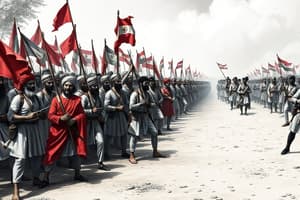Podcast
Questions and Answers
What event sparked the Revolt of 1857 in India?
What event sparked the Revolt of 1857 in India?
- Introduction of the Enfield rifle
- Growing influence of Western education
- Execution of Mangal Pandey for attacking British officers (correct)
- Annexation of territories under the 'doctrine of lapse'
Why did Indian sepoys refuse to use the Enfield rifle?
Why did Indian sepoys refuse to use the Enfield rifle?
- The cartridges were greased with pork and beef fat (correct)
- It was too heavy to carry
- It was too expensive to purchase
- It was outdated and ineffective
Which British policy contributed to the resentment among Indians?
Which British policy contributed to the resentment among Indians?
- Promotion of Indian cultural heritage
- Encouragement of Indian traditional practices
- 'Doctrine of lapse' leading to annexation of territories (correct)
- Heavy tax burdens on the Indian population
What was a major economic grievance that fueled the Revolt of 1857?
What was a major economic grievance that fueled the Revolt of 1857?
What role did religious concerns play in the Revolt of 1857?
What role did religious concerns play in the Revolt of 1857?
Why did the British East India Company's policies contribute to Indian resentment?
Why did the British East India Company's policies contribute to Indian resentment?
What was the main cause of the sepoy rebellion in Meerut?
What was the main cause of the sepoy rebellion in Meerut?
How do some historians view the 1857 rebellion?
How do some historians view the 1857 rebellion?
What was one of the contrasting viewpoints on the nature of the 1857 revolt?
What was one of the contrasting viewpoints on the nature of the 1857 revolt?
What immediate action did the British take to suppress the rebellion?
What immediate action did the British take to suppress the rebellion?
Despite not achieving independence, what lasting impact did the Revolt of 1857 have?
Despite not achieving independence, what lasting impact did the Revolt of 1857 have?
Flashcards are hidden until you start studying
Study Notes
The Revolt of 1857: Causes
The historic event known as the Revolt of 1857 in India, sometimes referred to as the Sepoy Mutiny or the First War of Independence, was a complex uprising that defies simple categorization. Though often described as a mutiny, it encompassed a multitude of grievances and motivations that fueled the extensive rebellion across northern India.
Introduction of Enfield Rifle and Religious Concerns
The rebellion began when Indian troops (sepoys) refused to use the Enfield rifle, which required them to bite the greased paper cartridges. A rumor spread that the grease used was a mixture of pork and beef fat. While there is no conclusive evidence to support this, the suspicion that the British were undermining Hindu and Muslim religious beliefs led to widespread discontent.
Economic and Political Factors
The British East India Company's (EIC) policies, such as the "doctrine of lapse," which involved the annexation of territories without a natural heir, and the growing influence of Western education and ideas, led to resentment among Indians. The British also imposed new land laws and heavy tax burdens, which contributed to the unrest.
Discontent Among Sepoys
The British failure to address the growing level of sepoys' discontent exacerbated the situation. An event that sparked the rebellion was the execution of Mangal Pandey, a sepoy, for attacking British officers. Later, sepoy troopers at Meerut refused to use the Enfield rifle cartridges, and when they were punished, it led to a violent uprising.
Contrasting Viewpoints on the Nature of the Revolt
Some historians argue that the rebellion was a mutiny, while others suggest it was a sustained effort to gain independence from British rule. Indian nationalists often view the events as a war of independence, whereas others argue that the rebellion was a more complex response to the British colonial presence.
Impact and Consequences
The rebellion spread rapidly across northern India and threatened British power, prompting the British to suppress the uprising with fierce determination. Despite its failure to achieve independence, the Revolt of 1857 laid the groundwork for the Indian independence movement that would follow in the coming century.
Studying That Suits You
Use AI to generate personalized quizzes and flashcards to suit your learning preferences.




